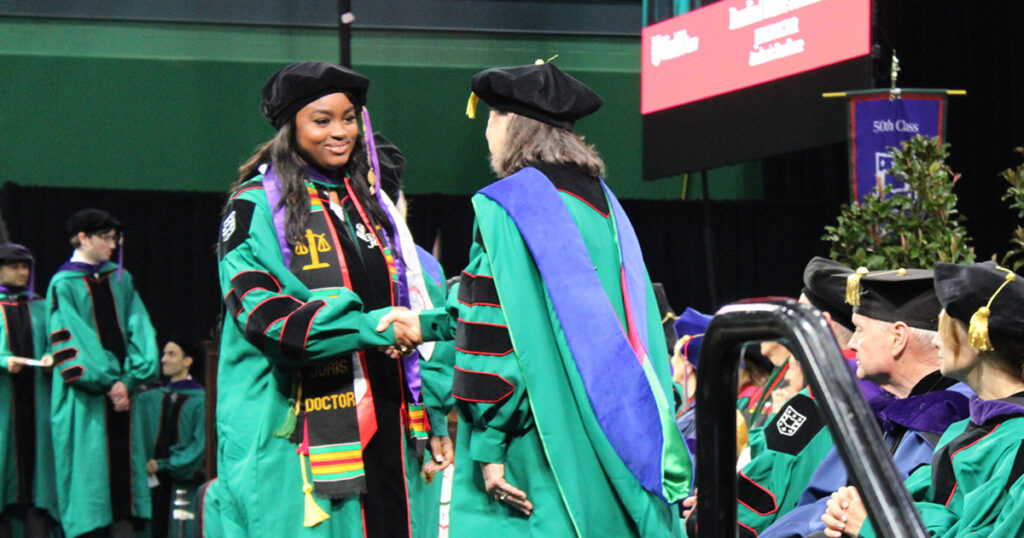Beyond Housing, the Missouri Supreme Court, and several 24:1 municipalities will partner on a pilot project that will consolidate and streamline municipal court systems within the 24:1, with the goal of bringing equity and efficiency to courts.
Over the next year, the Missouri Supreme Court’s Office of State Court Administration (OSCA) will work to bring multiple 24:1 municipal courts onto the state’s software system, thus providing consistency and transparency, including automatic reporting.
OSCA has received a $500,000 grant from the U.S. Department of Justice as well as additional technical assistance to aid in this endeavor. The funding will go towards development of case management software as well as the improvement of municipal divisions. As part of this pilot program, six municipal courts will have a critical tool in place to further share and consolidate court services.
The new case management software will give the public access to cases from their mobile devices and allow municipal divisions to text notices of hearing and payment dates, automate the determination of indigency, and refer defendants to payment or community service plans without an appearance in court.
In September of 2016, Missouri Chief Justice Patricia Breckenridge announced that the Supreme Court had adopted minimum standards for all Missouri courts, including requirements to have a judge on duty at all times, a clerk on duty for at least 30 hours per week, have a space large enough to accommodate the public, and to offer alternative payment plans for defendants without the ability to pay when assessing fees or fines.
“These minimum standards make clear how municipal divisions must operate,” Breckenridge said. “The standards are extensive and will guide the constitutionally required supervision by the presiding judge of each circuit and the Supreme Court.”
Beyond Housing began working with the 24:1 Community elected leaders on effectiveness and efficiencies in 2010. More recently, since early 2014, 24:1 municipalities have been working on court reform and consolidation. Since then, twelve of the 24:1 communities have expressed interest in consolidating courts. Two municipalities, Vinita Park and Vinita Terrace, will vote on a potential merger in November, which is poised to be the first municipal merger in St. Louis County Boundary Commission history.
Two court consolidations are already underway, in which nine municipalities have consolidated or are in the process of consolidating their operations into the municipal divisions of two other cities:
- Municipal operations from Charlack, Northwoods and Vinita Park have consolidated into the St. Ann municipal division.
- Municipal operations from Bellerive Acres, Cool Valley, Glen Echo Park, Greendale, Passadena Park and Uplands Park are expected to be consolidated into the Normandy municipal division.
“The city of St. Ann has had ongoing relationships with 17 municipalities over several years, providing various police services such as dispatching and holding facilities and, as of April 2016, consolidated municipal court divisions,” St. Ann Mayor Michael Corcoran said. “St. Ann’s municipal court was excited to assist the forward thinking of Mayor James McGhee of Vinita Park, Mayor Everett Thomas of Northwoods and Mayor Frank Mattingly of Charlack to assist them with being innovative in consolidating their municipal courts. Mayor McGhee of Vinita Park has managed to save his city approximately $80,000 a year, and the other mayors also have produced savings for their cities. The city of St. Ann will continue to support these efforts.”
“This partnership with the state of Missouri, Beyond Housing, and municipal partners, gives us another opportunity for the 24:1 communities to lead the region,” Normandy Mayor Patrick Green said. “The Normandy court has already been collaborating with our neighbors and we even recently hired a judge who is not a prosecutor or attorney in any other city. We’re here to dispel the myth that all North St. Louis municipalities want the status quo. We have been leading the change long before now, but this gives us an opportunity to act in new ways to foster trust between people, courts and government.”
“Court reform is a slow process, yet necessary for some municipalities in the 24:1. These new minimum standards bring equity and efficiency to all of Missouri’s courts,” said Chris Krehmeyer, the CEO of Beyond Housing. “They also will help pave the way for court consolidation in the 24:1, if that is what each of the residents of these municipalities decide is best for their community.”
Krehmeyer continued, “At Beyond Housing, our mission is to Ask-Align-Act – we ask residents what they would like to see and experience in their community, we align the resources and partners, and we work together to make it happen. This pilot project is the product of several years of asking and aligning, and we are now ready to act.”




